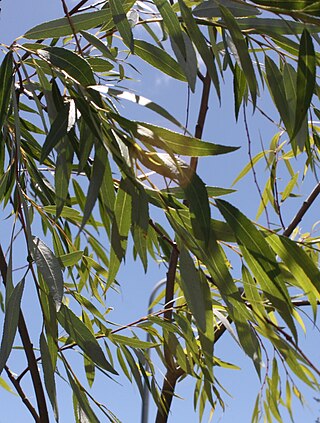
Pellaea is a genus of ferns in the Cheilanthoideae subfamily of the Pteridaceae. The genus name is derived from the Greek word πελλος (pellos), meaning "dark," and refers to the brown stems. Many members of the genus are commonly known as cliffbrakes. They primarily grow in rocky habitats, including moist rocky canyons, slopes, and bluffs.

Ilex mucronata, the mountain holly or catberry, is a species of holly native to eastern North America, from Newfoundland west to Minnesota, and south to Maryland and West Virginia.

Rhizophora is a genus of tropical mangrove trees, sometimes collectively called true mangroves. The most notable species is the red mangrove but some other species and a few natural hybrids are known. Rhizophora species generally live in intertidal zones which are inundated daily by the ocean. They exhibit a number of adaptations to this environment, including pneutomatophores that elevate the plants above the water and allow them to respire oxygen even while their lower roots are submerged and a cytological molecular "pump" mechanism that allows them to remove excess salts from their cells. The generic name is derived from the Greek words ριζα (rhiza), meaning "root," and φορος (phoros), meaning "bearing," referring to the stilt-roots.

Amalda is a genus of medium-sized sea snails, a marine gastropod mollusc in the family Ancillariidae, the olives and allies.

Othonna is a genus of approximately 90 species of succulent or subsucculent perennial herbs or shrubs, with its center of diversity in the Greater Cape Floristic Region (GCFR) of South Africa but some species' ranges include southern Namibia, Angola, and Zimbabwe. The genus was established by Linnaeus in 1753 containing 14 species, however, of those original species, only four are still retained in Othonna, while the others have been transferred to different genera including Cineraria, Euryops, Hertia, Ligularia, Senecio, and Tephroseris. The genus Othonnna is known to be monophyletic. In 2012, a new genus Crassothonna B. Nord. was erected with 13 species transferred from Othonna. A complete modern taxonomic treatment of the genus is being undertaken by the Compton Herbarium and the South African National Biodiversity Institute. The first part, a revision of the Othonnna bulbosa group, was published in 2019.

Ilex, or holly, is a genus of over 570 species of flowering plants in the family Aquifoliaceae, and the only living genus in that family. Ilex has the most species of any woody dioecious angiosperm genus. The species are evergreen or deciduous trees, shrubs, and climbers from tropics to temperate zones worldwide. The type species is Ilex aquifolium, the common European holly used in Christmas decorations and cards.

Cuspivolva is a genus of sea snails, marine gastropod mollusks in the subfamily Eocypraeninae of the family Ovulidae.

Salix mucronata is a tall, graceful, Semi-Deciduous willow tree. It grows along riverbanks in South Africa, and is used for a wide range of traditional medicines.
The Cape willow is dioecious.

Panopsis is a genus of trees in the family Proteaceae. The species, which occur in Central and South America, include: Newer species that can be considered part of the Panopsis genus has been discovered recently, called Panopsis magnifruta. Common areas where Panopsis species are seen to grow in are described to have elevated groundwater levels.
Vailia is a monotypic genus of flowering plants belonging to the family Apocynaceae. It just contains one species, Vailia mucronataRusby

Filodrillia is a genus of sea snails, marine gastropod mollusks in the family Borsoniidae, the cone snails and their allies.
Dendroxena is a genus of beetles in the family Silphidae.
Thamiaraea is a genus of beetles belonging to the family Staphylinidae.

Acrolocha is a genus of beetles belonging to the family Staphylinidae.
Alloeotomus is a genus of plant bugs belonging to the family Miridae.

Aloconota is a genus of beetles belonging to the family Staphylinidae.
Amischa is a genus of beetles belonging to the family Staphylinidae.
Pearsonema is a genus of nematodes belonging to the family Capillariidae.
Poricella is a genus of bryozoans belonging to the family Arachnopusiidae.
Phylloblastia is a genus of foliicolous (leaf-dwelling) lichens in the family Verrucariaceae. The genus was circumscribed in 1921 by Finnish lichenologist Edvard August Vainio, with Phylloblastia dolichospora assigned as the type species.












